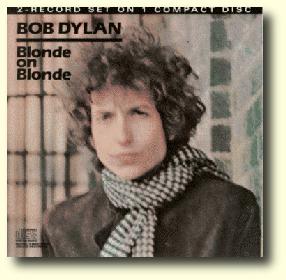 The
first time I heard about "Woodstock" was someone talking about Bob Dylan's enclave
up the Hudson Valley. It was 1967, I was a freshman at Fordham University in
the Bronx, NYC.
The
first time I heard about "Woodstock" was someone talking about Bob Dylan's enclave
up the Hudson Valley. It was 1967, I was a freshman at Fordham University in
the Bronx, NYC.
 The
first time I heard about "Woodstock" was someone talking about Bob Dylan's enclave
up the Hudson Valley. It was 1967, I was a freshman at Fordham University in
the Bronx, NYC.
The
first time I heard about "Woodstock" was someone talking about Bob Dylan's enclave
up the Hudson Valley. It was 1967, I was a freshman at Fordham University in
the Bronx, NYC.
One of my dorm-mates, Kirk, was an habitual name dropper and bragger. He came from somewhere near Woodstock, and he bragged that he knew about the legendary hangout where Bob Dylan jammed with counterculture musicians like the Band. Dylan was very popular in New York - it was where he made his name. The kids from The CIty knew all about his motorcycle accident, they all had Blonde On Blonde, they all got stoned and listened to Sad Eyed Lady of The Lowlands (11:20) for hours.
 | Woodstock was where "Music from Big Pink" was recorded, the Band's big debut album of '68. Dylan was involved in producing this record. "Big Pink" was pictured on the cover. It looked like anybody's house, nothing special. It reminded me of the little pink house on Barbara Lane that I had left behind, in which I and my seven siblings grew up, except that we didn't have a basement, a recording studio, or musicians. In any event, "Woodstock" already defined counterculture coolness. | |
|
"Big Pink"
|
||
 |
||
|
small pink
|
The next time I heard about Woodstock it wasn't about Dylan or The Band, it was a rumor about a big music concert, and it wasn't called "Woodstock" yet, but the rumor was that it was going to be up there somewhere, in the country, up the Hudson Valley from NYC. It was the spring of 1969, my sophomore year.
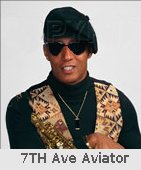 It
was a very rough year for me; I was not doing well in New York. I was starving,
literally. My grades had dropped, I was flunking my major. (What ever possessed
me to major in Physics?) I was only able to find part-time job for an hour or
so a day as a "7th
Avenue Aviator" in the garment District, 7th Ave & 34th St. right off Broadway
near Madison Square Garden. I would push hand trucks or racks of clothes from
the clothing manufacturer's shops to the small trucking warehouse a few blocks
away, where we would load the boxes of clothes onto waiting trucks and they
would ship off to New Jersey. One day I got robbed at knifepoint, after I picked
up a small package at the garment shop, probably an expensive wedding dress
or a gown. Very professional, no threats. The thieves knew. My boss told me
to keep quiet when I told him about it. Insurance would take care of it. Everybody
except me was either black or Hispanic, but I was a longhair, and I wore their
"uniform" - beret, aviator shades, so they gave me a pass.
It
was a very rough year for me; I was not doing well in New York. I was starving,
literally. My grades had dropped, I was flunking my major. (What ever possessed
me to major in Physics?) I was only able to find part-time job for an hour or
so a day as a "7th
Avenue Aviator" in the garment District, 7th Ave & 34th St. right off Broadway
near Madison Square Garden. I would push hand trucks or racks of clothes from
the clothing manufacturer's shops to the small trucking warehouse a few blocks
away, where we would load the boxes of clothes onto waiting trucks and they
would ship off to New Jersey. One day I got robbed at knifepoint, after I picked
up a small package at the garment shop, probably an expensive wedding dress
or a gown. Very professional, no threats. The thieves knew. My boss told me
to keep quiet when I told him about it. Insurance would take care of it. Everybody
except me was either black or Hispanic, but I was a longhair, and I wore their
"uniform" - beret, aviator shades, so they gave me a pass.
I wasn't making enough money to feed myself. I rented a room for $10 a week from an Irish spinster cleaning lady. We would watch "Laugh-In" on her TV on Sundays and she would try not to laugh at the more risque jokes. I would watch the young cockroaches skitter on the other side of her lace curtains in the kitchen. I took the subway back and forth, rush hour, standing the whole way. After the rent I had a dollar a day for food: a cheese sandwich and a can of soup. I'd get bean soup for the protein. I had rolling tobacco. The girl I was seeing, Beth, would want to go out, and if I didn't say no, we would spend the remaining $10, all I had, in no time at all. We went to a restaurant and I was embarrassed not to have anything for a tip. Beth loved Beaujolais and French literature. A pretty blonde Polish girl who wouldn't let me kiss her goodbye in front of her parents.
But soon enough Beth was introduced to Kirk, who had "helpfully" arranged for me to be renting that room from the Irish lady instead of being his roommate anymore, and he also did me the favor of replacing me as Beth's boyfriend. Kirk being the world-class asshole he was let me know about both of these things at the same time, and in a rather unconventional way. He first got over his nervousness by slipping a dose of LSD into something I was drinking, and he waited until the walls were melting. Then he told me, and abruptly disappeared.
If you dose somebody with LSD who is suffering from malnutrition, you don't expect the journey to be a dance through the tulips. In the middle of an agonizing afternoon alone in my apartment, I called Beth, who explained to me that I really had no business falling in love with her anyway.She was right, I had other emotional business to work through. The girl I had fallen in love with back home would be having our baby soon, and I wouldn't be there, and I would never see the baby. I had asked her to marry me, she had said no. She didn't love me. For her it had been a moment of weakness. Her parents then pressured her to marry me but I couldn't marry her if she didn't love me, and I couldn't even feed myself let alone a baby.
This recalled an earlier incident with Kirk. My roomates were getting tired of me agonizing about what to do. One said "Marry her". The other said "Don't marry her". The first said "Talk to a priest". And so I did. I walked over to campus with my roomates, and I went into the confessional, I sat down, and I waited for them to call the priest over, who soon arrived. I started to cry as I told my story about the girl who was having my baby, and who didn't love me, and the priest encouraged me to go on, but then I started to hear chuckling. Then outright laughing. It was Kirk, in the confessional, pretending to be a priest. I came out, and Kirk Maurer and my other roomate were laughing at me.
 I
was down to my last twenty cents after buying a packet
of Bugler rolling tobacco - enough to get a subway
token and ride the 3rd Avenue "EL" down
to the clinic that I could see from the elevated subway,
just before it went underground to cross the Harlem
River as it left the Bronx to enter Manhattan. I got
in line with the drunks and shuffled up to the desk
where the nurse waited.
I
was down to my last twenty cents after buying a packet
of Bugler rolling tobacco - enough to get a subway
token and ride the 3rd Avenue "EL" down
to the clinic that I could see from the elevated subway,
just before it went underground to cross the Harlem
River as it left the Bronx to enter Manhattan. I got
in line with the drunks and shuffled up to the desk
where the nurse waited.
"Are you twenty -one years old?" She asked.
"No, I'm twenty".
"Well, then you need a note from your parents before
you can sell blood."
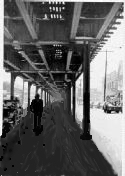 My parents were 300 miles away. I had not a penny
in my pocket, and I was forty blocks from my apartment.
Several miles,it seemed, in one of the most dangerous
places on earth - the South Bronx. I walked for hours
up the middle of the road, double-parked cars end
to end, abandoned and stripped, each five-story-walkup
apartment building along the way a boarded up hulk
with bullet holes in every doorway. I was too hungry
and too exhausted to waste any energy being frightened,
thankful that it was broad daylight. I had long ago
learned how New Yorkers walk - with a sweeping scan
that maintains visibility from all angles. By the
time I reached the familiar blocks of my neighborhood,
I had reached a lightheaded sense of peace and a feeling
that I could keep walking forever. It was a lovely
sunny spring day, and I particularly remember the
deep green mint leaf and the red lettering of the
Breyer's Ice Cream sign in the shop window. Maybe
the ice cream sign represented hope.
My parents were 300 miles away. I had not a penny
in my pocket, and I was forty blocks from my apartment.
Several miles,it seemed, in one of the most dangerous
places on earth - the South Bronx. I walked for hours
up the middle of the road, double-parked cars end
to end, abandoned and stripped, each five-story-walkup
apartment building along the way a boarded up hulk
with bullet holes in every doorway. I was too hungry
and too exhausted to waste any energy being frightened,
thankful that it was broad daylight. I had long ago
learned how New Yorkers walk - with a sweeping scan
that maintains visibility from all angles. By the
time I reached the familiar blocks of my neighborhood,
I had reached a lightheaded sense of peace and a feeling
that I could keep walking forever. It was a lovely
sunny spring day, and I particularly remember the
deep green mint leaf and the red lettering of the
Breyer's Ice Cream sign in the shop window. Maybe
the ice cream sign represented hope.
 I knew I had to get out of New York City for good,
and I had arranged to transfer to Syracuse, where
my brother Gary was a year behind me. I felt safer
knowing I'd be with him at college. My sister Lorraine
sent me $20. It was May, school was over.I boarded
a bus at the Port Authority terminal, with a few boxes
of things, and the great oppressing weight of fear,
hunger, loneliness and alienation began to lift from
my heart. I was free again, and I was going to survive.
Each mile that the bus traveled away from New York
made the sun shine brighter. The baby had been born
in April, and was healthy and beautiful, by all accounts,
and was adopted by a good family.
I knew I had to get out of New York City for good,
and I had arranged to transfer to Syracuse, where
my brother Gary was a year behind me. I felt safer
knowing I'd be with him at college. My sister Lorraine
sent me $20. It was May, school was over.I boarded
a bus at the Port Authority terminal, with a few boxes
of things, and the great oppressing weight of fear,
hunger, loneliness and alienation began to lift from
my heart. I was free again, and I was going to survive.
Each mile that the bus traveled away from New York
made the sun shine brighter. The baby had been born
in April, and was healthy and beautiful, by all accounts,
and was adopted by a good family.
 I had a
good summer job between school years those days, working for the Power Authority
of The State of New York, climbing the high voltage transmission towers that
bring electricity from Niagara Falls, and painting them. I worked with Dave
Beck, and Fred Gaske and his brother Bill, and Schultz and "Boogie-meister".
We climbed the towers together and spent the day holding on with one hand with
a death grip, furiously painting with the other. No belts - they slowed us down.
We were risking our lives but we kept up a constant macho back-and-forth that
kept us from thinking about how close to the edge we were. Most of the money
I made was spent drinking beer all summer long, but I would save a little money
to last me the next school year. But the summers were the most glorious euphoria
of young and drunk and strong. Spending afternoons in a roadhouse with the boys
after climbing off the tower, the horrors of New York City faded. I got tougher.
From living in New York I learned how to cut people off at the knees the minute
they started giving me any crap. From climbing the towers I had a grip that
could crush someone's throat. I feared nothing.
I had a
good summer job between school years those days, working for the Power Authority
of The State of New York, climbing the high voltage transmission towers that
bring electricity from Niagara Falls, and painting them. I worked with Dave
Beck, and Fred Gaske and his brother Bill, and Schultz and "Boogie-meister".
We climbed the towers together and spent the day holding on with one hand with
a death grip, furiously painting with the other. No belts - they slowed us down.
We were risking our lives but we kept up a constant macho back-and-forth that
kept us from thinking about how close to the edge we were. Most of the money
I made was spent drinking beer all summer long, but I would save a little money
to last me the next school year. But the summers were the most glorious euphoria
of young and drunk and strong. Spending afternoons in a roadhouse with the boys
after climbing off the tower, the horrors of New York City faded. I got tougher.
From living in New York I learned how to cut people off at the knees the minute
they started giving me any crap. From climbing the towers I had a grip that
could crush someone's throat. I feared nothing.
Then my best friend Gerry Komrowski mentioned "Woodstock". I knew what he was talking about. We were at the Forum, the hang-out bar in Baldwinsville, my home town, where I did most of my summer beer drinking. Gerry had been a bartender there until he got fired for giving away too much liquor. It was a hot Thursday night, August 14, 1969, and from the rumors that had been floating around off and on this was going to be a big deal. Hendrix was mentioned as a possibility, although it wasn't clear what groups were going to be there. We talked about tickets, and decided we would just go and get them when we got there. We would leave after work tomorrow, Friday, and drive down.
It was nearly the end of summer, I would be starting at Syracuse soon, it was hot, and we needed some entertainment. Gerry would drive, Louis Green would ride shotgun and I would be stuck in the back of Gerry's car. Stuck, because Gerry had blown the muffler, and because the pipes were rotten he had stuck a muffler directly on the engine headers, with no pipes, which was almost like having no muffler at all. It was so loud we couldn't hear ourselves talk, so we drove without talking.
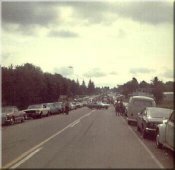 It's
about three hours drive from Baldwinsville, to Syracuse,
to Route 81, to Binghamton, to route 17, to Liberty
New York, where we got off route 17, according to
some sort of directions we had managed to get, and
on to a little country road. Swan Lake Road. It would
have been 8 o'clock or so, still light, but getting
dark. As soon as we left route 17, there was a lot
of traffic. Bumper to bumper - it crawled. We inched
along for what seemed like hours, the muffler roaring
every time we pushed the gas pedal. It got dark, and
there were now cars parked on both sides of the road,
bumper to bumper. We were going to have to find a
place to park, and I was desperate to get out of the
noise, so I volunteered to walk ahead and find a parking
space. I soon left Gerry and Louis behind as I walked
forward, but the parked cars formed an unbroken chain
on both sides of the road. I walked for a mile or
so.
It's
about three hours drive from Baldwinsville, to Syracuse,
to Route 81, to Binghamton, to route 17, to Liberty
New York, where we got off route 17, according to
some sort of directions we had managed to get, and
on to a little country road. Swan Lake Road. It would
have been 8 o'clock or so, still light, but getting
dark. As soon as we left route 17, there was a lot
of traffic. Bumper to bumper - it crawled. We inched
along for what seemed like hours, the muffler roaring
every time we pushed the gas pedal. It got dark, and
there were now cars parked on both sides of the road,
bumper to bumper. We were going to have to find a
place to park, and I was desperate to get out of the
noise, so I volunteered to walk ahead and find a parking
space. I soon left Gerry and Louis behind as I walked
forward, but the parked cars formed an unbroken chain
on both sides of the road. I walked for a mile or
so.
A brightly lit, large house appeared on a small hill, and as I came up to it, I realized it was a big country bar. I was thirsty, and inside the place was rocking. People were asking me where I was from, laughing, buying me beer. After a while I thought I should check on my friends, so I stepped outside the door.
It was raining. It was dark. I looked at the long line of cars, and tried to multiply their crawling pace by the amount of time I had been inside. Were they ahead of me now? Or still behind me? I started to worry. I hadn't brought my jacket with me, it was still in the car. We hadn't brought sleeping bags or a tent. Nothing. I hadn't eaten much of anything. I walked quickly down to the road and looked up and down the line of cars, and started to walk in the same direction they were heading. I walked for another mile, and I came up on a '55 Chevy, faded red, and someone in the car called out to me. "Hey there".
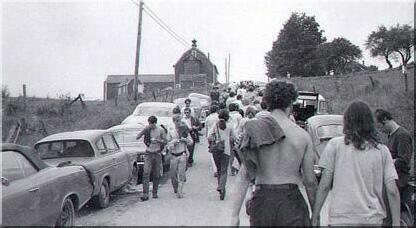 I
recognized the car, and the boys in the car. They
were from Binghamton. I had met them briefly at a
party in Syracuse a month or so earlier, they were
friends of Ed Hamm's, from the Army I think. I hopped
on the back of the '55 Chevy and we inched along for
another mile until there was an opening where we could
park.
I
recognized the car, and the boys in the car. They
were from Binghamton. I had met them briefly at a
party in Syracuse a month or so earlier, they were
friends of Ed Hamm's, from the Army I think. I hopped
on the back of the '55 Chevy and we inched along for
another mile until there was an opening where we could
park.
They hadn't brought any tent, or sleeping bags, or food either. We started walking in the same direction as a lot of other people who had also abandoned their cars. We met some people coming the other way and we asked how much farther to Woodstock.
"Well, this isn't Woodstock, it's White Lake, I think it's about 13 miles up this road." That's when the enormity of this thing hit me. I had already walked several miles, with double-parked cars bumper to bumper, and we were just getting started.
We walked for hours, an army of dark and quiet people, whispering, laughing, talking. There were few lights, lanterns, or lamps of any sort. Once in a while we would come across an entrepreneur hawking his goods. We rested. We came up on a little resort with cottages and the woman sold us a blanket for two dollars. We offered to buy more but it was her last one. It was in Bethel. We came on to a chain link fence pushed over in the brush - it was the fence line. The absurdity of worrying about tickets now hit me. We were close now. It started to rain again, and we headed into a woods at the top of the hill to get some shelter. We lay down on the blanket. There were five of us. I was able to get my head on a corner of the blanket, and we slept. It was well after midnight on Saturday, the 16th.
Friday the 15th was the first day of Woodstock, and the acts were all folk music. Richie Havens was on stage for over an hour straight because they couldn't find anyone to follow him. Joan Baez was the top of the bill Friday night, but things were so disorganized that she wasn't on stage until early Saturday morning. I only know these things because I read them somewhere. We were walking in all Friday night, and by the time we reached the woods at the top of the hill there was no indication that anything was happening on the other side of the hill, where the stage was set up.
At dawn we got up and started to move again, sore and aching from the rain and the long night. The stage was just the other side of the hill, back towards where we had seen the chain link fence. We came out of the woods and crested the hill, and there it was. Woodstock.
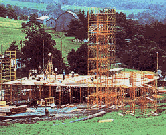 It
was a natural amphitheater, a hollow slope with a
lake at the bottom and rolling hills on the other
side. Between us and the lake was a double scaffold
that looked about a hundred feet high, hung with black
boxes - the speakers. There was no one on the stage,
no one near the stage, which was about ten - fifteen
feet above the ground. We moved down the hill toward
the stage, and entered the sea of mud. As we walked
closer, the mud got deeper. We went as far as the
point where the mud was about to suck our shoes off,
and we stopped and looked around:at the stage, up
the long hillside, the acres of mud, with an occasional
sleeping bag sticking halfway out of the mud. We noticed
a line of booths stage left, back near the entry point
where we had first seen the chain link fence. We went
up to the booths, and there were a couple of people
offering a bag of potato chips for $5. We thought
we might do better.
It
was a natural amphitheater, a hollow slope with a
lake at the bottom and rolling hills on the other
side. Between us and the lake was a double scaffold
that looked about a hundred feet high, hung with black
boxes - the speakers. There was no one on the stage,
no one near the stage, which was about ten - fifteen
feet above the ground. We moved down the hill toward
the stage, and entered the sea of mud. As we walked
closer, the mud got deeper. We went as far as the
point where the mud was about to suck our shoes off,
and we stopped and looked around:at the stage, up
the long hillside, the acres of mud, with an occasional
sleeping bag sticking halfway out of the mud. We noticed
a line of booths stage left, back near the entry point
where we had first seen the chain link fence. We went
up to the booths, and there were a couple of people
offering a bag of potato chips for $5. We thought
we might do better.
There was no one else around to ask what was going to happen. When and if the music would start. Where or if there was any food or water. We looked at each other, we looked at the sea of mud, and the garbage, and two or three of us at the same time said
"Let's get out of here".
We started walking again, like robots, silent, determined. Hungry, thirsty, exhausted, dirty. After a couple of hours the Saturday people began to stream in. Two hundred thousand Long Islanders who heard from their friends and headed north. We met them all on our way out. Now it real\ly was Woodstock. Everyone was a psychedelic gypsy, thousands of girls in shiny satin blouses that were a lot more jiggly than I had ever noticed before, and bandanas and flutes and everyone seemed to be smiling and laughing. We five were marching out through a day long parade of hippy reinforcements. We were the exhausted veterans straggling out, they were the fresh-faced kids who still thought war was glorious.
Some of my friends from NYC approached, and they could not understand why I was leaving. I was too tired to explain. We walked all day, and we somehow managed to find the faded red '55 Chevy, which if it had been a more common model might never have been found.
I hopped on the back of the car again and we made our way out, with a little less traffic this time. When we got back to Liberty, the whole town was a huge lawn party, and the residents handed us sandwiches and cups of Kool-Aid as if we were returning from a great battle. I got in the car, and the next thing I knew we were in Binghamton, and the boys dropped me off and said goodbye. I hitchhiked the 70 miles back to Syracuse in two rides.
That night, Saturday, I was back in the Forum in Baldwinsville, drinking a beer and watching television, where it seemed the only thing on TV was coverage of Woodstock. No one in the bar paid much attention. I said nothing. It was a pretty quiet night. I wondered what happened to Gerry and Louis Green.
They didn't show up again until Monday night , after it was all over. Gerry was mildly upset that I hadn't tried to find them . He said they had the stage announce my name over and over again. He had spent the entire time completely wasted on acid. I was glad I hadn't been there. I cannot imagine tripping on acid with a half million people wading in the mud and garbage in the hot sun with nothing to eat or drink. But Gerry was in his element. He could make lemonade out of a bushel of rotten lemons, and it would be the best lemonade he ever had.
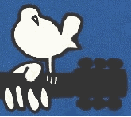 I
asked Gerry about my jacket, my blue jean jacket that
I prized and had left behind in the car. He tossed
it to me; it stunk of smoke and had charred holes
in it. Seems they had an engine fire and used my jacket
to put the fire out. I cleaned the blue jean jacket
and embroidered it all over with symbols of our Woodstock
adventure, and kept it for years afterward, holes
and all. I had been to Woodstock, in and out, and
survived, and lost my friends and found others. Someone
later said they saw me on the nightly news that weekend,
riding on the back of a car, but there must have been
ten thousand young hippies who looked just like me
riding on the backs of ten thousand cars that weekend.
I hadn't seen any of the stage performances, but I
saw a great show in any event. I would never again
be intimidated by the people who hated the hippies,
or be afraid of the generation that was sending us
to be killed in the jungles of Viet Nam, because I
knew we had our own army, and we were strong enough
that we didn't have to be afraid of them any more.
I had seen the largest, most peaceful gathering of
people on the planet, ever. Everyone we met was good
to us, even the poor lone State Trooper who stood
on the corner at White Lake helplessly as a hundred
thousand stoned, half dressed hippies surrounded him
and smiled at him as he pretended to direct traffic.
I
asked Gerry about my jacket, my blue jean jacket that
I prized and had left behind in the car. He tossed
it to me; it stunk of smoke and had charred holes
in it. Seems they had an engine fire and used my jacket
to put the fire out. I cleaned the blue jean jacket
and embroidered it all over with symbols of our Woodstock
adventure, and kept it for years afterward, holes
and all. I had been to Woodstock, in and out, and
survived, and lost my friends and found others. Someone
later said they saw me on the nightly news that weekend,
riding on the back of a car, but there must have been
ten thousand young hippies who looked just like me
riding on the backs of ten thousand cars that weekend.
I hadn't seen any of the stage performances, but I
saw a great show in any event. I would never again
be intimidated by the people who hated the hippies,
or be afraid of the generation that was sending us
to be killed in the jungles of Viet Nam, because I
knew we had our own army, and we were strong enough
that we didn't have to be afraid of them any more.
I had seen the largest, most peaceful gathering of
people on the planet, ever. Everyone we met was good
to us, even the poor lone State Trooper who stood
on the corner at White Lake helplessly as a hundred
thousand stoned, half dressed hippies surrounded him
and smiled at him as he pretended to direct traffic.
In a few weeks I started at Syracuse. I was living in a dorm again, for one semester, until I turned 21. Although it was my third year, I was surrounded by freshmen, one of whom had a Fender Jazzmaster with a full Marshall stack that I would play in the "study cubicle" that I had decorated with black light posters . I spent most of my time in the girl's dorm next door, and soon a new girlfriend found me. Sheila said she was attracted to me because I was a loner - I looked like the sort of person who didn't need to have friends. A couple of months later, after she sewed us matching dashikis, we drove down to NYC to attend the wedding of Kirk and Beth . Maybe Sheila was right.